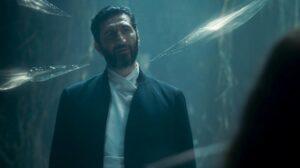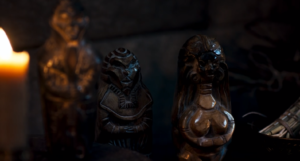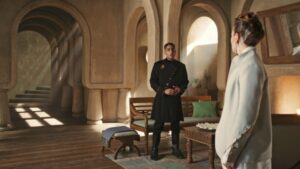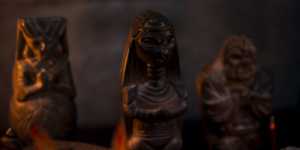SPOILERS FOR THE WHEEL OF TIME BOOKS ONE THROUGH THREE, AHEAD!
With the second season of Amazon’s criminally-underrated fantasy epic The Wheel Of Time aiming for a release date later this year (ambiguous, yes, but at least we’re looking at an interval of no more than two years between seasons), and a full-length trailer expected almost any day now, I feel like a lot of returning casual fans will want to refresh their memory of what happened in the admittedly confusing first season finale and what it means for the show’s future, as outlined in Robert Jordan’s daunting fourteen-book series. So get ready, because starting today, I’ll be bombarding you all with details from the finale you might have missed and analysis of certain plot-beats and character moments, which will hopefully give you plenty of reasons to get hyped for the The Wheel Of Time‘s second turning. And I couldn’t think of a better place to kick off this series than with a deep-dive into the Forsaken, characters I can’t wait to see onscreen at long last.

The Forsaken, in Robert Jordan’s books, were the thirteen most powerful channelers (magic-users) who joined the Dark One during the Age of Legends, several-thousand years before the events of The Wheel Of Time, receiving the gift of immortality in exchange for helping the Dark One escape from the place outside time and space where he had been imprisoned since the moment of creation. They were ultimately unsuccessful, and as punishment for their treason, they were instead imprisoned alongside the Dark One by Lews Therin Telamon, a male channeler later known merely as “The Dragon”, when he went to the Eye of the World and sealed up the small rift in the fabric of reality that the Dark One had been using to issue orders to his followers. It’s hard to imagine what that was like, being trapped in the cold dark void outside the universe for thousands of years, unable to die, but it certainly didn’t help any of the Forsaken get to a better place mentally and emotionally.
The inevitable weakening of the seals on the Dark One’s prison near the end of the Third Age allows the Forsaken to begin escaping back into the world, just in time to pose a serious threat to Rand al’Thor, a male channeler who discovers that he is the reincarnation of Lews Therin Telamon, the last Dragon, and that he is destined to either save the world, by strengthening the ancient seals, or destroy it, by freeing the Dark One. That’s where The Wheel Of Time, in both the books and the show, begins – although for the first seven episodes of the show, the identity of the Dragon Reborn is a mystery and Rand is just one of several qualified candidates, including his friends Egwene al’Vere, Nynaeve al’Meara, Perrin Aybara, and Mat Cauthon. The Dark One is equally uncertain who is the Dragon, and thus dispatches the greatest of the Forsaken, their leader Ishamael, to begin stalking each of them in their nightmares.
(Before we continue, I feel like I should reiterate that this post contains one major spoiler from the ending of The Dragon Reborn, the third book in The Wheel Of Time, which is also a spoiler for the opening of season two, but only very minor spoilers from the rest of books two and three, so if you’re just starting the books after finishing the first season or if you plan to, turn back now and be warned that certain things will happen earlier in the show than in the books, which may impact your enjoyment of the books).
Ishamael, affectionately referred to as “Ishy” by the fandom, is the mysterious man with flaming eyes played by Swedish-Lebanese actor Fares Fares who appears prominently in both Rand and Perrin’s dreams and is immediately misidentified as the Dark One. He reappears after Rand confirms to himself that he is the Dragon, and has a conversation with him, or rather with the soul of Lews Therin Telamon, where he gleefully mocks Lews for taking the form of a weakling shepherd, but again Rand is oblivious to a whole bunch of clues and thinks he’s talking directly to the Dark One. At the Eye of the World, he faces Ishamael a third time, and this time Ishamael uses Rand’s ignorance to his advantage, deliberately posing as the Dark One and letting Rand obliterate his physical body with the One Power, all while standing on a prominent seal embedded in the floor that Rand unintentionally shatters as he’s attacking the man he thinks is the Dark One.
Not just any seal. One of the seven seals, long thought to be unbreakable, that the last Dragon sacrificed his sanity to install so that the Dark One could never escape again. And Rand just broke it (he can’t help it, he’s a himbo). One could argue that none of this was clearly conveyed in the actual episode, but my counterargument – and the reason I’m telling you all of this – is twofold: firstly, the episode ends with Moiraine and Lan investigating the broken seal and discovering that it’s made of cuendillar, a supposedly unbreakable substance, which a shaken Moiraine cites as evidence that the battle with the Dark One isn’t over, far from it, and secondly, enough time has passed since the finale that the folks over at Amazon don’t seem to care if people know that the man Rand fought wasn’t the Dark One, because the teaser trailer for season two outright confirms that he’s the Dark One’s “strongest lieutenant”, not the Dark One himself, and that Rand’s actions set the Forsaken free. I think it’s safe to assume that all of this is going to come out early in the season premiere anyway, before Moiraine and Lan presumably set out to find Rand and inform him of what happened.

But will they reach him before one of the Forsaken does? I won’t spoil anything the show hasn’t deliberately chosen to spoil already, so you’ll just have to watch and find out, but I can tell you a little about each of the Forsaken. In the books, there are thirteen – Aginor, Asmodean, Balthamel, Be’lal, Demandred, Graendal, Ishamael, Lanfear, Mesaana, Moghedien, Rahvin, Sammael, and Semirhage – but the show has seemingly whittled that number down to a more manageable eight, at least going by the number of sinister votive statuettes that the Warder Stepin uses to ward off the Forsaken in episode five. The figures represented by these statues are not immediately distinguishable in all cases, but the general consensus among fans is that the eight Forsaken we’ll meet in the series are Asmodean, Demandred, Graendal, Ishamael, Lanfear, Moghedien, Sammael, and Semirhage.
And that’s fine by me. Sure, a handful of folks will miss Mesaana, and there’s some stuff she and Rahvin do in the books that I suppose will have to be done by other Forsaken in the show, but we still have plenty to go around, any one of them a hundred times more compelling than all of the remaining Forsaken combined. Aginor and Balthamel were some of the first Forsaken introduced in book one, The Eye Of The World, yet even their powers combined weren’t enough to prevent the former being taken down by an untrained teenager, and the latter by a tree. And as for Be’lal…well, I’m wracking my brain, but I have to be honest, I don’t remember if he spoke once in fourteen books. There’s nothing we gain from having them all around, and the advantage to dropping them is that the Forsaken in the show won’t be competing with a bunch of corny villain-of-the-week types for more screen-time and more significance to the story.
First and foremost among the Forsaken stands Ishamael, the Betrayer of Hope, who is considered the strongest characters in the series behind Lews Therin Telamon. During the Age of Legends, his name was Elan Morin Tedronai and he was a revered member of the Aes Sedai (back when the organization accepted both male and female channelers), but his studies into the workings of the Wheel of Time led him to the horrific conclusion that in every Turning of the Wheel, the Dark One would attempt to break free from his prison and do battle with the soul of Lews Therin Telamon, the so-called Dragon. Tedronai became convinced that the Dark One’s eventual victory was assured, as he would need to succeed only once to break the Wheel of Time, rip up the Pattern, and end the cycle of rebirth that allowed the Dragon to challenge him over and over throughout history. Deeming it safer to be on the Dark One’s side when this day came, Tedronai betrayed the Aes Sedai and became the Dark One’s strategist and representative on earth, leading to later generations conflating the name of Ishamael with that of the Dark One himself. Though he was sealed up alongside the other Forsaken, Ishamael was able to escape much earlier than the others, allowing him to set the stage for the Dark One’s return by orchestrating the Trolloc Wars and the War of the Hundred Years.
Lanfear, the Daughter of the Night, is believed to be the strongest female channeler in The Wheel Of Time alongside Semirhage, but in the books she is outranked by all of the male Forsaken for no good reason except that in Robert Jordan’s gendered magic system, even the weakest male channeler starts out stronger in the One Power than a strong female channeler, and the cap on his abilities is much higher than for a woman. Women are supposed to be more “dexterous” with the One Power, which theoretically evens the playing-field, but in Lanfear’s case it just makes so much more sense thematically if she’s second to Ishamael, both in strength and in the Dark One’s eyes, because being second to Lews Therin Telamon (and second to Ilyena in Lews Therin’s heart) was what originally drove her to the Shadow. In fact, it was in an effort to outdo Lews Therin that she accidentally drilled the hole in the Dark One’s prison through which he was able to influence the world (and behind which she was later sealed). The bitter irony of her story is that she’s extremely powerful and intelligent in her own right, but there’s always just one person standing between her and first place whom she can’t help but become fixated on tearing down. Fittingly, she’ll also be the second Forsaken introduced in The Wheel Of Time‘s second season.
Demandred, the One who Twists the Blade, is a somewhat enigmatic character who deliberately avoids the spotlight until very late in the book series, making it difficult to say where he ranks among the Forsaken. Of the eight suspected to appear in the show, I have him in third place behind Ishamael and Lanfear because he was said to be one of the strongest male channelers alive during the Age of Legends, and was often mentioned in the same breath as Lews Therin Telamon, although the two were rivals from the moment that both men fell in love with an Aes Sedai named Ilyena. When she chose Lews Therin, Demandred (or Barid Bel Medar, as he was then named) channeled his jealous rage into his research. He is credited with the rediscovery of sword-fighting and military strategy, art-forms which had been lost to the people of that blissful Age, but he fancied himself a real general because of this, and believed that when war broke out between the Dark One and the Aes Sedai, he would be chosen to command the forces of the Light – only for Lews Therin, the Dragon, to steal the coveted position and the honors it entailed. Demandred joined the Shadow soon after, becoming the Dark One’s greatest military leader.

In fourth place I have to put Semirhage, the Promise of Pain, because again, while the books state that the female Forsaken are weaker than all of the male Forsaken, I personally refuse to accept that as canon and you can’t make me – and in any case, Semirhage is said to be so dexterous with the One Power that she’s probably equivalent in strength to Lanfear, who I placed second behind Ishamael. Once a renowned Healer named Nemene Damendar Boann, she single-handedly rid the world of all illnesses and ailments during the Age of Legends, but found herself increasingly bored as her work decreased and she she realized she could accomplish nothing further through the One Power unless she began inventing new diseases and injuries. Torture became her one passion in life, and when the Aes Sedai tried to sever her from the One Power, the Dark One offered her a place at his side where she could do whatever she wanted with those unlucky souls who fell into her hands. Her unspeakable cruelty to prisoners-of-war earned her a reputation for being the most terrifying of all the Forsaken.
Sammael, the Destroyer of Hope, is vying for the fifth spot with Rahvin, an almost identical character with a similar role in the story – ultimately, I believe the two will be merged, and if I had to pick a name for this composite character, I’d go with Sammael. He was an exceptional athlete named Tel Janin Aellinsar in the Age of Legends, and a close friend of Lews Therin Telamon. But at some point during the war between the Dark One and the Aes Sedai, Aellinsar randomly grew jealous of Lews Therin’s military prowess and joined the Shadow. Hot take, maybe, but the show can only improve upon the books when it comes to fleshing out each of the Forsaken’s individual motivations, because we’ve already got two characters whose defining personality trait is jealousy, specifically of Lews Therin Telamon, and I don’t think we need a third – for Sammael I’m thinking we make him the character who turns to the Shadow out of repressed, unreciprocated love for Lews Therin, because the Forsaken are too fundamentally queer-coded of an organization for there to not be any queer Forsaken in the show (since problematic bisexual Balthamel is probably getting cut). Just imagine the angst when Sammael is instructed to exploit his friendship with the Dragon and betray humanity.
Sixth place goes to Graendal, the Vessel of Pleasure, who has a nauseating talent for reducing people to willing, worshipful slaves with the use of a complicated Compulsion weave. The other Forsaken regard her with disdain, because she deliberately gives them reason to believe she wastes her time collecting attractive prisoners to fill the ranks of her personal harem and forcing them to engage in…activities…while she watches on dispassionately, but the truth is that she’s the most competent multi-tasker of any of them, using the Compelled to carry out her dirty work in every corner of the continent. She is also, ironically, something of a willing slave herself, and takes great pride from shepherding her fellow Forsaken when they get out of line and start double-crossing each other and the Dark One. During the Age of Legends, she was a celebrity psychologist named Kamarile Maradim Nindar, who advocated for a lifestyle of restraint, without luxury or adornment. But as the Age careened to a close, she abandoned her principles and indulged in the pleasures she’d denied herself up to that point, including everything the Shadow had to offer.
Asmodean, whose name means merely Musician, is that and little else, as far as the Forsaken and the Dark One are concerned. During the Age of Legends, he was an acclaimed singer and songwriter named Joar Addam Nessosin who was also fairly strong with the One Power, but nonetheless he struggled with such a severe case of imposter syndrome that he turned to the Shadow solely for the opportunity to burn the entire music industry to the ground and arise from its ashes as the world’s only bard for all eternity. He blinded other songwriters whose work he envied, cut out the tongues of every talented singer he could find, and for whatever reason severed his own Aes Sedai mother from the One Power before throwing her to the Dark One’s Shadowspawn and watching them tear her to pieces. Still, because he never dedicated himself to training with the Power, he ranks seventh among the Forsaken.
Moghedien, the Spider, trails far behind the other Forsaken in terms of strength, and she knows better than anyone how easy it would be for her enemies to crush her, like her namesake, if they ever caught her in the waking world, on the field of battle. But that hasn’t happened yet, because Moghedien never puts herself in harm’s way and falls for no traps. She scurries silently through the World of Dreams, targeting an opponent’s weaknesses and withdrawing into the shadows too swiftly for their groggy counterattacks to land, re-emerging only when it’s safe. The other Forsaken regard her as a coward, but Moghedien, who once operated the Dark One’s intelligence network behind enemy front lines as an investment advisor named Lillen Moiral, bears their contemptuous remarks with patience. She knows her way works. And she certainly knows better than to risk a confrontation with any of them.

Assuming these are, in fact, the eight Forsaken represented in The Wheel Of Time‘s first season as small, harmless statuettes, there are at least three who will probably appear in season two. Ishamael is a guarantee, as we’ve already seen him in the teaser. Lanfear is a guarantee, as she’s a major character in the early books. And Moghedien, I think, ought to be introduced or teased near the end of this season. As for the other Forsaken…well, you’ll just have to wait and find out when and where they’re introduced. But please, feel free to share your own thoughts, theories, and opinions, in the comments below!